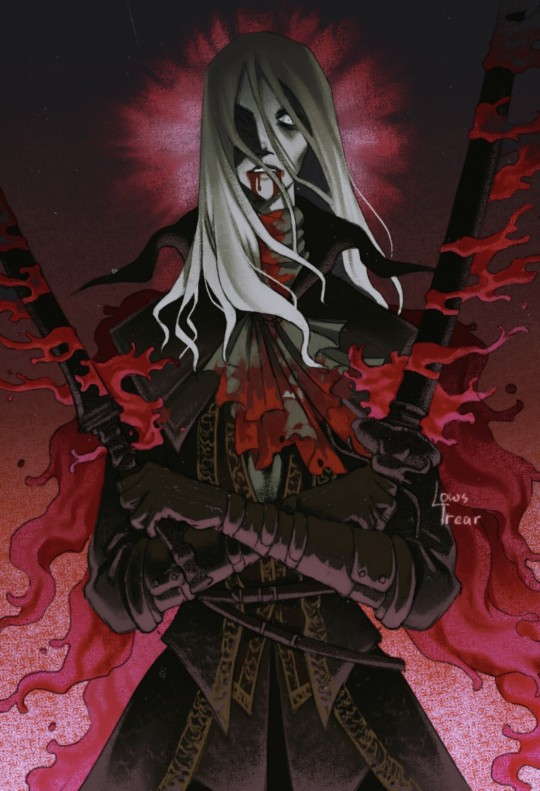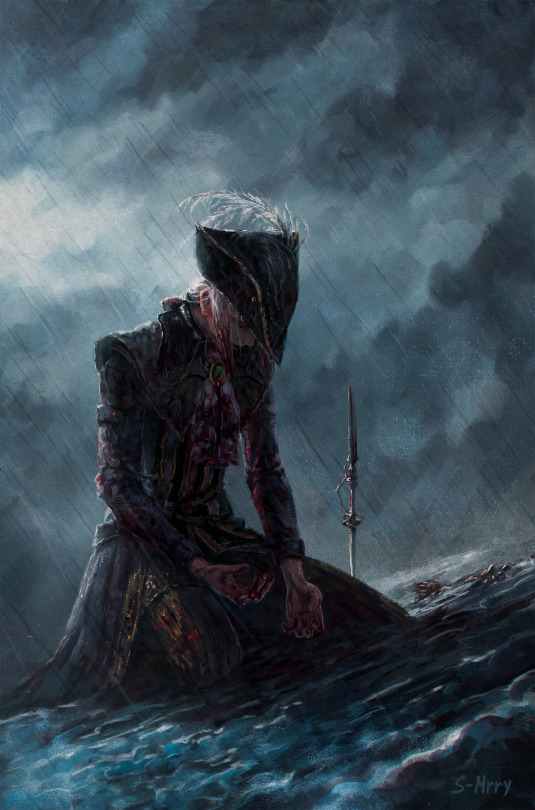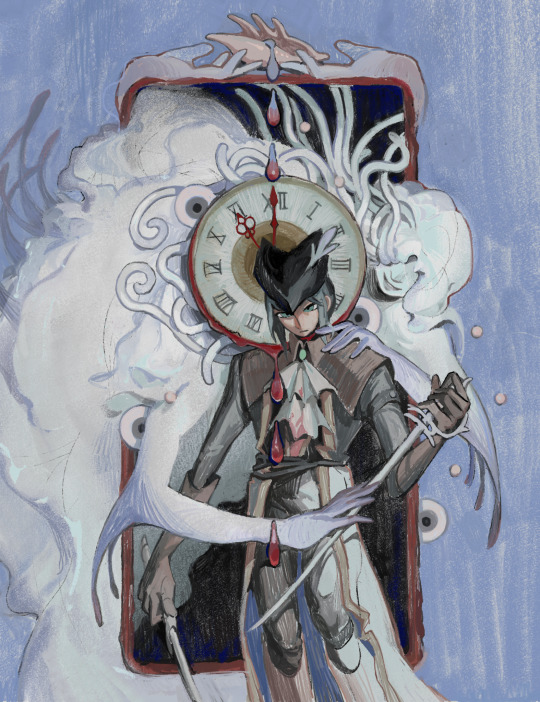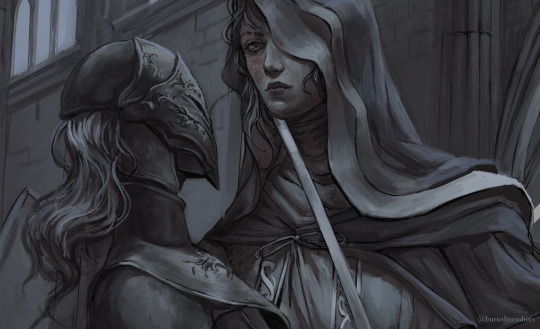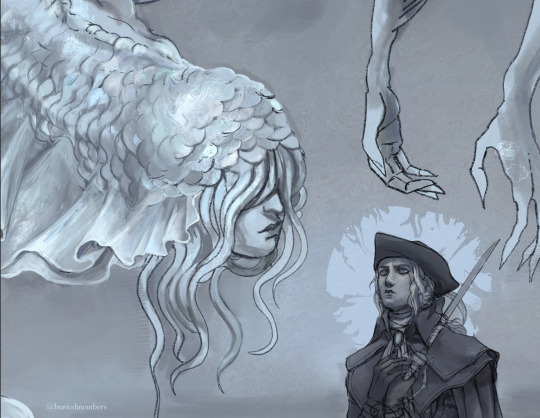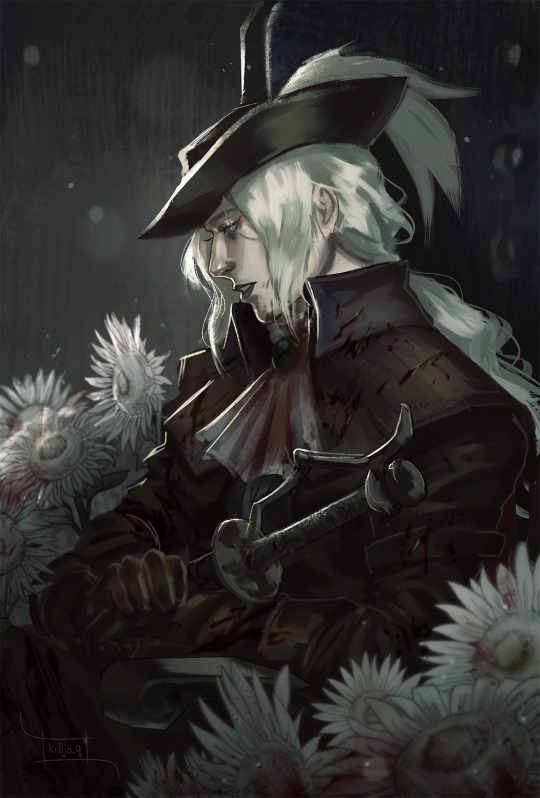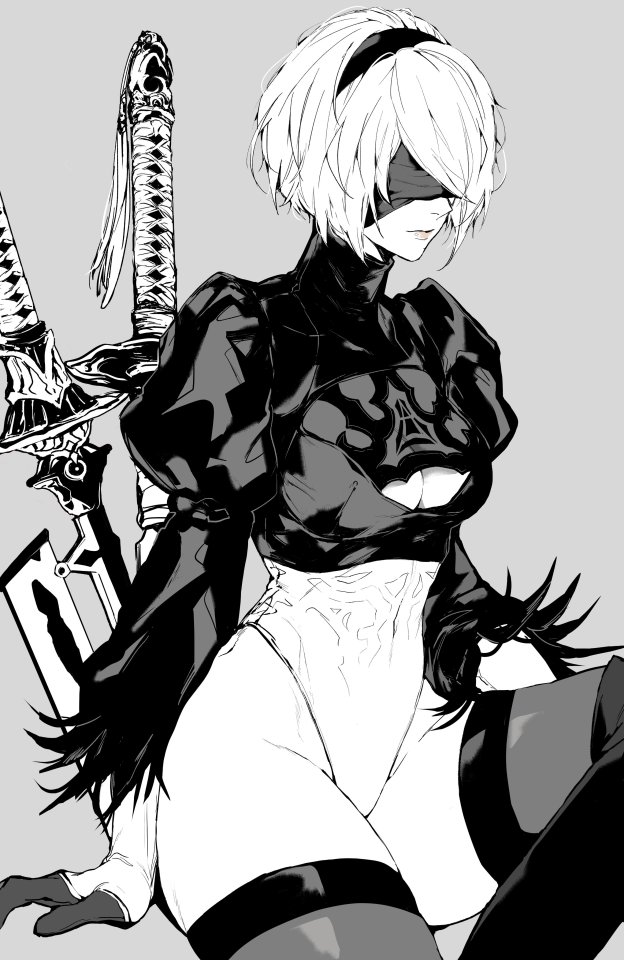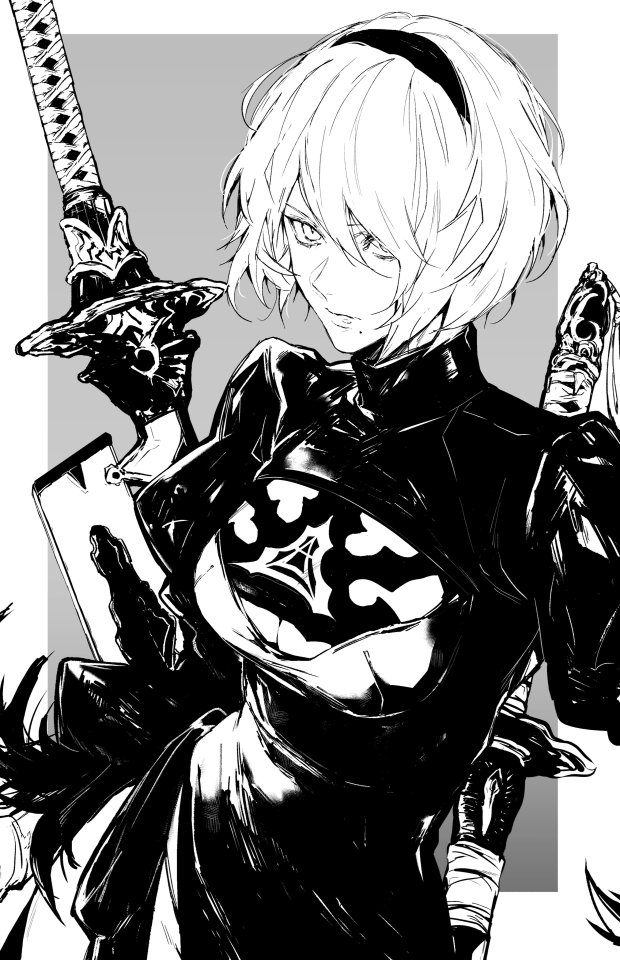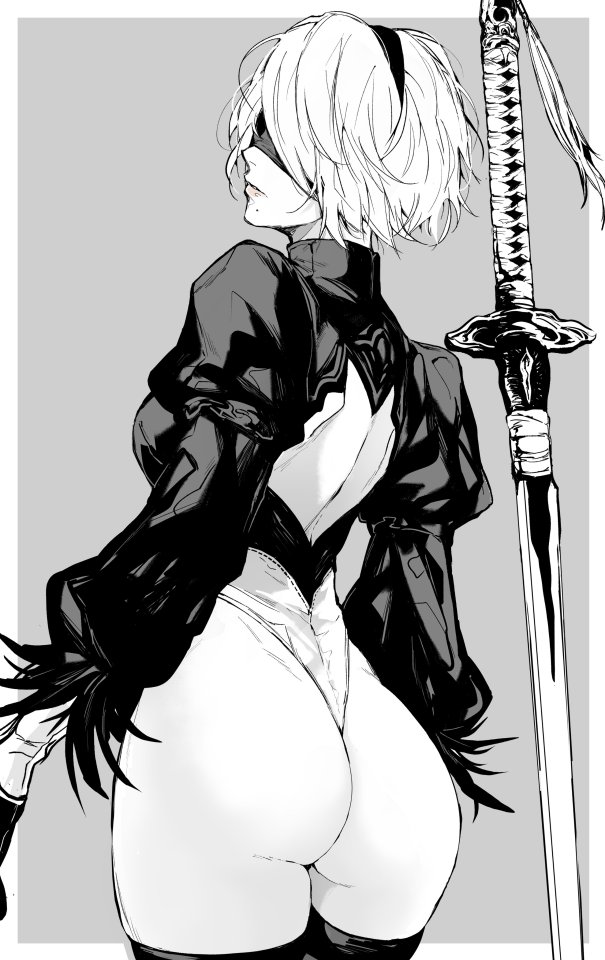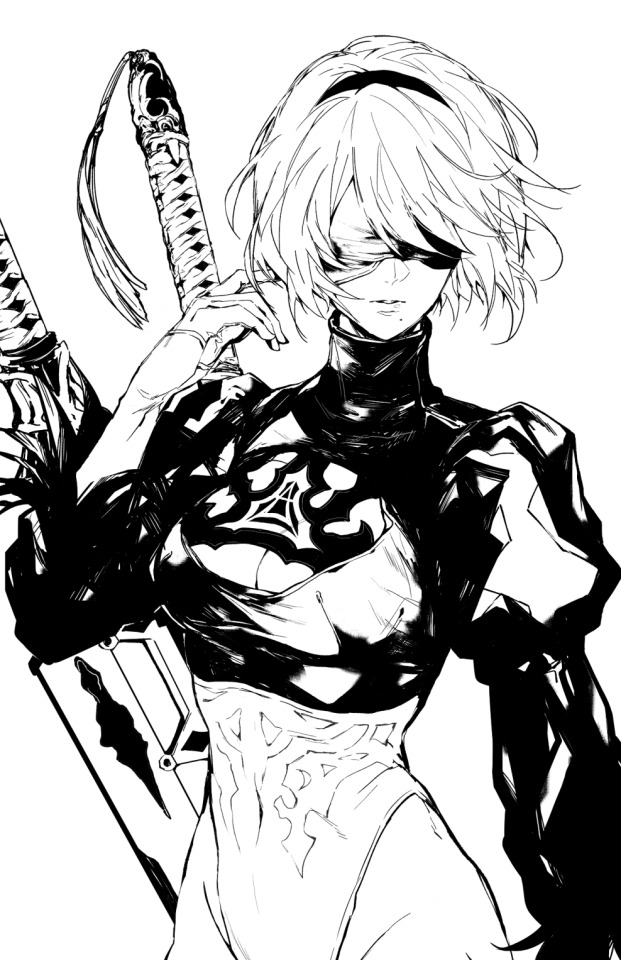Don't wanna be here? Send us removal request.
Text

Listen for the baneful chants. Weep with them, as one in trance. And weep with us, oh, weep with us...
10K notes
·
View notes
Text

"Only an honest death will cure you now... Liberate you -- from your wild curiosity. "
[ lady maria of the astral clocktower - bloodborne - my piece for the female rage zine ]
1K notes
·
View notes
Text
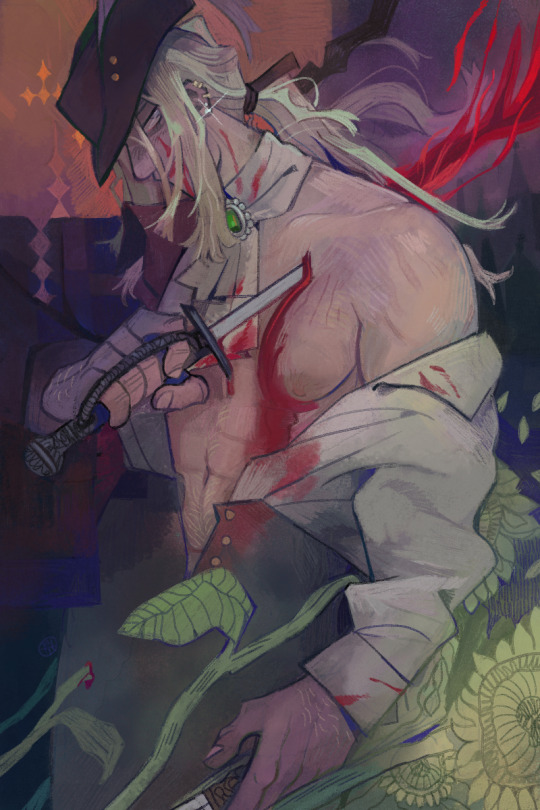
"A corpse... should be left well alone."
---
Lady Maria from last April's fanart friday! :3c 💖💕
| patreon | subscribestar | bluesky | twitter | ig |
2K notes
·
View notes
Text
This is the funniest Umineko review of all time:

4K notes
·
View notes
Text
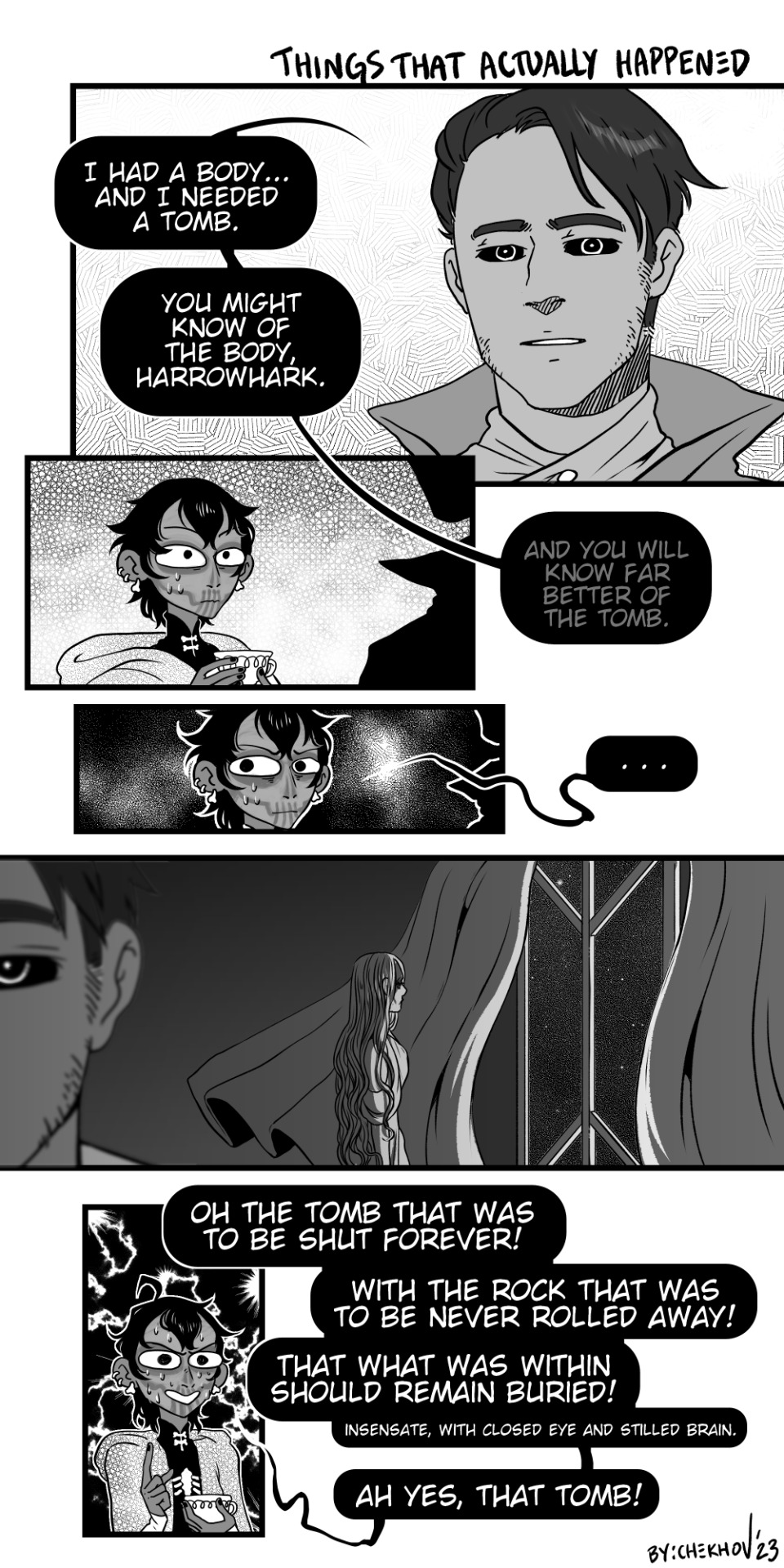
Everyone, trying to warn me: Harrow the Ninth is so complicated and so hard to get through and you won't have any idea what the hell is happening!
Me: Harrow the Ninth is peak comedy if your sense of humor is fucked beyond all sense.
#The Locked Tomb#Harrowhark Nonagesimus#harrow the ninth aka harrow steps on a dozen dozen rakes in succession
7K notes
·
View notes
Text


Dubiously accurate RP update: scruffs them (feat. roefizzlebeef and inedyr_)
Bonus: (feat. vermilionwind)

#ffxiv oc#Eir Blackmaw#Remeraux Melret#ahh that's my girl!! that's our wlws!!#the girl and the dragon very fucking gay
10 notes
·
View notes
Text

Eir(s)
#ffxiv oc#YOU WILL ALL LOOK AT EIR BLACKMAW RIGHT MEOW#I adore her#Eir Blackmaw#thank you rook these eirs are great
4 notes
·
View notes
Text
long post abt accessability in games, DMC3, DS1, and control schemes
games like God of War or Devil May Cry can be inaccessible because they have inputs which require button mashing, which is difficult for someone with arhritis or other problems that affect their hands and wrists. but these inputs are generally not required to beat the game; you have a lot of options, so you can just avoid using any move that's too difficult. the main issue is that these games become more demanding the further into the game you want to go; keeping a combo going in DMC requires a very high apm and use of the entire controller, so a person with a motor disability will hit a wall eventually.
this is a design problem which i think is difficult to analyze. DMC starts from a very unique design—it has a huge number of moves, almost all of which are accessible out of neutral rather than hidden at the end of an attack string—which it has to pay for by using a large number of unique inputs (forward + attack, back + attack, forward then back + attack, hold shoot to charge, hold devil trigger to charge [charges can be buffered]). it introduces a lot of complexity, but it's actually less complexity right away than other action games; instead of having to memorize a long list of complicated strings (cf. Bayonetta's Punch, Punch, Kick, Kick, pause, Kick, which is different from Punch, Punch, Punch, Kick, Kick, pause, Punch [click]—have fun with those!), you can learn attack, shoot, devil trigger, then forward attack, hold shoot... etc., one at a time, and mix them into your play and find out when they're good. its combo system is not just complex but also discoverable; players can try out how its different pieces fit together without opening the movelist.
but once a player already knows all the moves, the game starts to ask more and more out of them. not only do you want to use all of the inputs one after the other very fast (try jump cancelling Beowulf's Killer Bee into another Killer Bee for the first time—pretty tough, right? and all you're pressing there is X and △! the inputs get harder!), but since your charge moves can be buffered, you also want to hold O and L1 to charge your shot and devil trigger for when you might need them, and you might also want to lock-on by holding R1. when watching a really good player playing with an input viewer it's not uncommon to see every single button on the controller light up at the same time. doing that stuff is really fucking hard.
so far we don't have any problems; it's a picture perfect picture of a system that's 'easy to use, hard to master,' right? but because the thing thats hard to do in this case is input a lot of buttons at once on a physical controller, we've just frozen out any players with hand/wrist problems or motor issues from high level play, at least without adapting the game somehow. this is a problem that's difficult to predict, difficult to foresee, and difficult to design around; i don't see how you could fix it without making DMC a completely different game than what it is.
so if you started from the premise of designing a game that was accesisble to people with hand/wrist and motor issues (including suckers like me who played a bunch of high apm games like DMC and Runescape and fucked up their wrist), you'd have to come up with something pretty different at a very fundamental level.
this is why Dark Souls is, in a lot of ways, a VERY ACCESSABLE action game. what do i mean? its control scheme is extremely simple. once you press every button on the controller you've learned everything you're going to learn about it (apart from one very non-obvious hard-coded universal cancel, but don't worry about it). all you have to do is dodge or block the other's guys attack and then hit him with yours.
there's a lot of ways that DeS/DS1 approached the action genre differnetly to other games, but right now i'm only going to highlight one: the kind of 'questions' DS is asking its player. if you think about DMC, what is DMC trying to get the player to do? while you can beat the game with one or two simple combos, the system is obviously made in a way that encourages freedom and flexibility, and the game has systems to reward long, varied combos (the 'style' rating). and that's all it wants you to do (apart from in a couple of levels where they want you to do platforming—ugh!). to accomplish this, they lock you in a room with some enemies and only let you out when you beat them all.
in Demon's Souls the main thing they want you to do is navigate complicated dungeons that are full of traps; some levels have mazes in them, and lots of traps kill you instantly. it's similar to Kings Field, which its a spiritual successor to, but it's also similar to other early 3d RPGs: Deathtrap Dungeon, Die by the Sword, Dungeon Lords... (in one interview Miyazaki said part of his job was to play a bunch of 'open world RPGs' for research, and i imagine that included some of these old, weird games; the first dungeon in Dungeon Lords has a rafter-walking section with projectile-shooting enemies, chain-pulley mechanical elevators and highly damage-resistant slimes). they also want you to kill enemies. but the game never forces you to kill these enemies; you're never locked in a room until you kill all the enemies, and enemies never have items that are necessary to progress in the level. enemies are just one obstacle among others. consequently, enemy encounters are designed in a certain way that makes avoiding them difficult and approaching them complex. an enemy that throws firebombs will stand at the top of a long, narrow staircase, forcing you to dodge them on the way up; two enemies will stand behind a doorway and, if you run in blindly, will both attack you from behind. things like that. it was hard to avoid enemy encounters in Demon's Souls because the levels involved suffocatingly narrow corridors and the enemies followed you forever. but it was possible and sometimes desirable. in DS1 running by enemies is often preferable and, with foreknowledge of the level, always possible. it's also a lot easier as enemies don't follow you very far anymore (this change was patched into the game after release).
running and jumping both consume stamina, as do dodging, blocking, and attacking. getting hit costs hitpoints, and falling off a ledge costs all your hitpoints. both aspects of the game (navigation and combat) use all of the same resources, and engaging in combat is generally one of a few options the player has to navigate an area. it is, a lot of the time, by far the easiest option, but most players will find a few areas that they hate enough to always run through. one of the messages players can leave to each other is 'try dashing through.' the game rewards you for killing enemies by giving you souls and loot drops, but it also punishes you for making mistakes by leaving you down on resources—less health, fewer estus, and fewer spellcasts—so the best thing to do at any given time is difficult to analyze.
the questions DS is asking its players, therefore, is to familiarize themselves with the level, come up with a plan, conserve their own resources and make it out with the loot. at lower levels of play the game is mostly about succeeding at lots of combats and navigating lots of traps over a long distance without making too many small mistakes. then, at high levels of play, the gameplay is mostly about movement, exploiting the game's verticality and taking advantage of holes in the enemy placement. but the change from low to high levels of play mostly takes place in the mind of the player, not their hands; they understand the levels better, they are better able to respond to things which were previously unpredictable to them, and they have more confidence in their ability to do what is needed of them.
so our game not only starts off very accessible to players with hand/wrist or motor problems, but it finishes there too. although, i've gone a little too far: the player's hands will change a bit as they improve at the game. like Monster Hunter, the best way to play Dark Souls is to have a claw grip in both hands; the thumbs should operate the analogue sticks, the index finger should operate the d-pad (for toggle escales, the universal cancel i mentioned, as well as changing spells) and the face buttons (for rolling, using items, interacting with doors and items), and the remaining digits manipulating the shoulders/triggers (for attacks, blocks and parries). while running, you want to hold L1 (block) so you can roll (circle) out of a run without jumping. this might be hard for you depending on your condition, but i don't think it's that much worse than holding a controller the regular way.
anyway, the point is this: you might want to think about making your game accessible not just to the general player with disabilities, but to the 'hardcore' player with disabilities. do you want disabled people to not only beat your game, but be really good at it? how would you design systems to accomodate that? i've talked about hand/wrist and motor issues here because it's what i was thinking about (and some games, like Runescape, aren't really accessible to me anymore thanks to my wrists, at least in the way i used to play them), but there are other disabilities you could probably design around. imagine a player who has CFS or ADHD in a way that keeps them from practicing consistently; could you make a game that is rewarding for such a player to try and get really good at nonetheless? Runescape (conceived of competitively, ie. racing to the leaderboard &c) was good for players with certain kinds of disabilities and neurotypes since it required a huge amount of time and dedication, it really rewarded being unemployed, LOL. but what if there was a game that somehow rewarded inconsistency? who knows...
anyway, i'm saying how i tend to think about it as a rebuttal to the way i see most people talk about accessibility in games, which is merely playing games. thus Dark Souls can be criticized for being difficult for a new player to complete, for example. but this always struck me as a bewildering way to talk about games. plenty of disabled people don't just want to complete games, they want to be good at them. and disabled people can and do become good at games and compete and win at them. so the question for me is not so much 'how do i make a game someone with this disability could play?' but 'how do i make a game someone with this disability would want to master?'—a game which doesn't create headaches for them, which works with rather than against them, and which they actually enjoy at all levels of play.
#this is some really good meta and jives a lot with something I've always thought about souls games#it asks a player to learn systems and layouts and enemy behavior but those are all things you can think about at your own pace#But at high levels of play it never asks you to rattle on 20 complex inputs at once you know?#the cadence is slow and rhythmic#I've reached an incredibly high level of play in these games while I can barely touch fighting games#because they ask way too much of my brain and my wrists and fingers on a level of microseconds
336 notes
·
View notes
